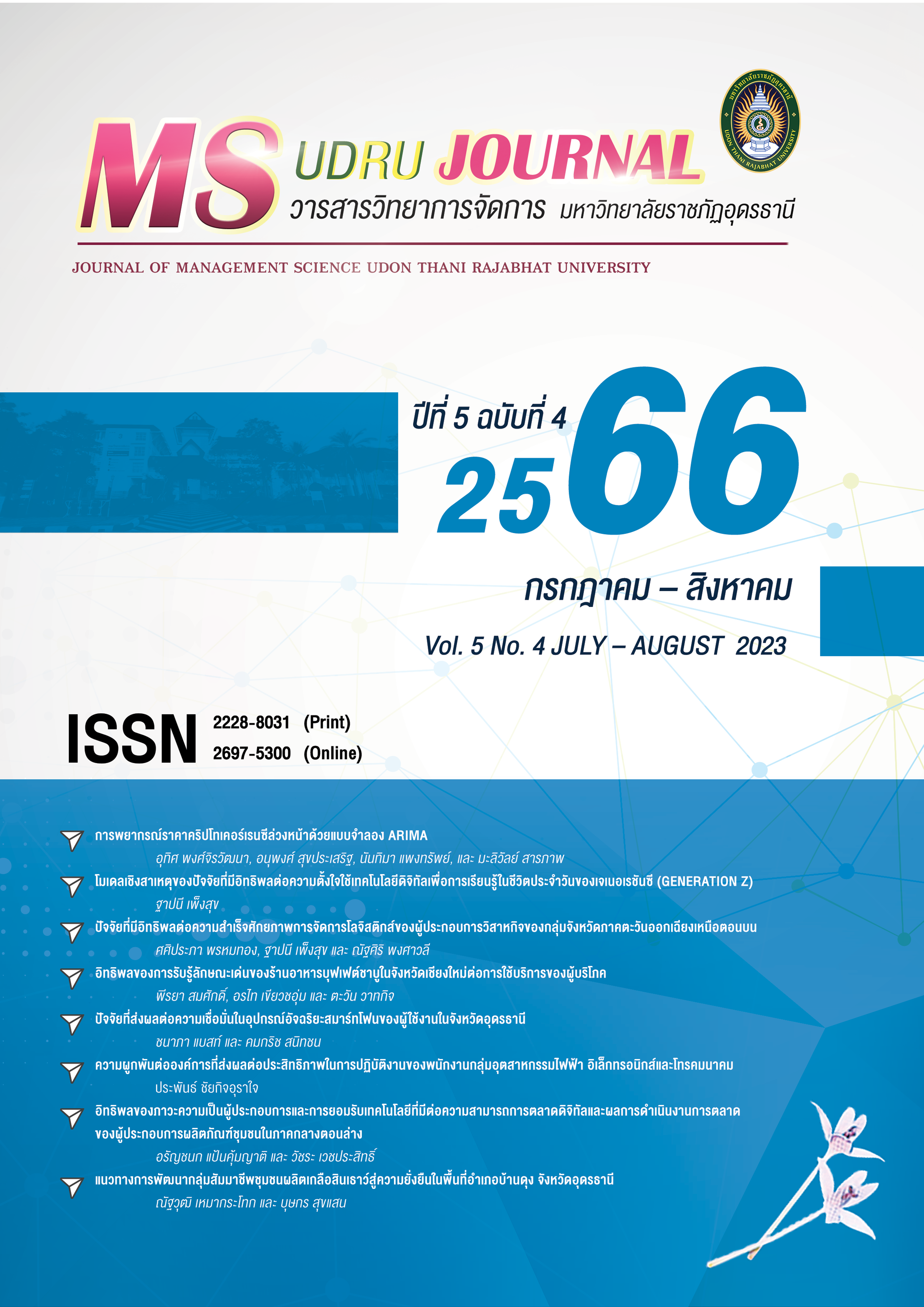ปัจจัยที่ส่งผลต่อความเชื่อมั่นในอุปกรณ์อัจฉริยะสมาร์ทโฟนของผู้ใช้งานในจังหวัดอุดรธานี
Main Article Content
บทคัดย่อ
การวิจัยครั้งนี้มีวัตถุประสงค์เพื่อศึกษาปัจจัยที่ส่งผลต่อความเชื่อมั่นในอุปกรณ์อัจฉริยะสมาร์ทโฟนของผู้ใช้ในจังหวัดอุดรธานี และศึกษาปัจจัยด้านการรับรู้ความปลอดภัย ความเป็นส่วนตัว และตัวแทนจำหน่วยอุปกรณ์ที่ส่งผลต่อความเชื่อมั่นในอุปกรณ์อัจฉริยะสมาร์ทโฟนของผู้ใช้งานในจังหวัดอุดรธานี กลุ่มตัวอย่าง คือ เป็นประชาชนที่อาศัยอยู่ในจังหวัดอุดรธานีที่มีประสบการณ์ใช้งานอุปกรณ์อัจฉริยะสมาร์ทโฟน จำนวน 700 คน ด้วยวิธีการสุ่มอย่างง่ายและเก็บรวบรวมข้อมูลด้วยแบบสอบถาม มีลักษณะเป็นแบบมาตราส่วนประมาณค่า 5 ระดับ โดยผ่านการหาความเที่ยงตรง มีค่าดัชนีความสอดคล้อง (IOC) เท่ากับ 0.69 และผ่านการหาความเชื่อมั่น (Reliability) โดยมีค่าสัมประสิทธิ์แอลฟาของครอนบาคเท่ากับ 0.93 วิเคราะห์ข้อมูลโดยใช้โปรแกรมสำเร็จรูปสำหรับการวิจัยทางสังคมศาสตร์ ผลการวิจัย พบว่า ผู้ใช้งานมีความเชื่อมั่นในอุปกรณ์อัจฉริยะสมาร์ทโฟนมีความสอดคล้องกับข้อมูลเชิงประจักษ์โดยพิจารณาจากค่าไคสแควร์ที่องศาอิสระ ค่าดัชนีวัดระดับความกลมกลืนเท่ากับ 0.97 ค่าดัชนีวัดระดับความกลมกลืนที่ปรับแก้แล้ว เท่ากับ 0.95 และค่ารากที่สองของความคลาดเคลื่อนโดยประมาณ เท่ากับ 0.05 และค่ารากของค่าเฉลี่ยกำลังสองของเศษเหลือในรูปแบบคะแนนมาตรฐาน 0.022 (/df = 3.243, GFI = 0.970, AGFI = 0.950, Standardized RMR = 0.022 , RMSEA = 0.050) ปัจจัยด้านตัวแทนจำหน่ายส่งผลทางตรงเชิงบวกต่อความเชื่อมั่นในอุปกรณ์อัจฉริยะสมาร์ทโฟน รองลงมาปัจจัยด้านความปลอดภัย และปัจจัยด้านการรับรู้ความเป็นส่วนบุคคล อย่างมีนัยสำคัญทางสถิติที่ระดับ 0.01 ตามลำดับ
Article Details

อนุญาตภายใต้เงื่อนไข Creative Commons Attribution-NonCommercial-NoDerivatives 4.0 International License.
บทความที่ได้รับการตีพิมพ์เป็นลิขสิทธิ์ของคณะวิทยาการจัดการ มหาวิทยาลัยราชภัฏอุดรธานี
ข้อความที่ปรากฏในบทความแต่ละเรื่องในวารสารวิชาการเล่มนี้
ไม่ใช่ความคิดเห็นและความรับผิดชอบของผู้จัดทำ บรรณาธิการ กองบรรณาธิการ และคณะวิทยาการจัดการ มหาวิทยาลัยราชภัฏอุดรธานี ความรับผิดชอบด้านเนื้อหาและการตรวจร่างบทความแต่ละเรื่องเป็นความคิดเห็นของผู้เขียนบทความแต่ละท่าน
เอกสารอ้างอิง
กฤตย์ษุพัช สารนอก และณมน จีรังสุวรรณ. (2564). ปัจจัยที่มีผลต่อการตัดสินใจซื้อลำโพงอัจฉริยะ. สารนิพนธ์มหาบัณฑิต วิทยาลัยการจัดการ มหาวิทยาลัยมหิดล.
กัลยา วานิชย์บัญชา (2561). สถิติสำหรับงานวิจัย. พิมพ์ครั้งที่ 12. กรุงเทพฯ: คณะพาณิชยศาสตร์และการบัญชี จุฬาลงกรณ์มหาวิทยาลัย.
ชลิดา กรณ์ใหม่. (2561). ปจจัยที่สงผลตอทัศนคติและความตั้งใจใชอุปกรณอัจฉริยะแบบสวมใสไดของประชาชนในกรุงเทพมหานคร. สารนิพนธ์ปริญญาบริหารธุรกิจมหาบัณฑิต มหาวิทยาลัยกรุงเทพ.
นันทภัค แต่รุ่งเรือง. (2562). ปัจจัยที่มีอิทธิพลต่อความเชื่อมั่นในการใช้แอปพลิเคชั่น KMA ของลูกค้าธนาคารกรุงศรีอยุธยา จำกัด (มหาชน). วิทยานิพนธ์ปริญญาบริหารธุรกิจมหาบัณฑิต บัณฑิตวิทยาลัย มหาวิทยาลัยศิลปากร.
ศูนย์วิจัยธนาคารกสิกรไทย (2561). SME จับเทรนด์อุปกรณ์อัจฉริยะได้ยอดขายพุ่ง. ธนาคารกสิกรไทย (K SME Analysis). สืบค้นเมื่อ 10 พฤษภาคม 2566, จาก https://www.kasikornbank.com/business/sme/KSMEKnowledge/article/KSMEAnalysis/Documents/Smart-Device-Trend_2017.pdf.
สำนักงานส่งเสริมเศรษฐกิจดิจิทัล. (2565). การประเมินสถานภาพอุตสาหกรรมซอฟแวร์ ฮาร์ดแวร์ และอุปกรณ์อัจฉริยะและบริการดิจิทัลประจำปี 2564 คาดการณ์แนวโน้ม 3ปี. สืบค้นเมื่อ 1 พฤษภาคม 2566, จาก https://www.depa.or.th/th/article-view/20220926_02.
สำนักงานสถิติแห่งชาติ. (2564). สำมโนประชากรจังหวัดอุดรธานี. สืบค้นเมื่อ 24 พฤษภาคม 2566, จาก http://www.nso.go.th/sites/2014/Pages/pop/สำมะโนประชากร.aspx.
อรุณโรจน์ จิตร์ภิรมย์ศรี. (2564). ปัจจัยด้านความรู้ ทัศนคติ และแนวโน้มต่อการใช้เทคโนโลยีอินเทอร์เน็ต ในทุกสรรพสิ่ง internet of things (IoT) ของผู้ใช้เทคโนโลยีฯ ในกรุงเทพมหานคร. วิทยานิพนธ์ปริญญาบริหารธุรกิจมหาบัณฑิต สาขาวิชาการจัดการการสื่อสารองค์กร คณะวารสารศาสตร์และสื่อสารมวลชน มหาวิทยาลัยธรรมศาสตร์.
Abdi, N., London, C., Ramokapane, K.M., Such, J.M., London, C., Clara, S. (2019). More than smart speakers: security and privacy perceptions of smart home. personal assistants this paper is included in the proceedings of the. In Proceedings of the Fifteenth USENIX Conference on Usable Privacy and Security, pp. 451–466.
Ajzen, I. & Fishbein, M., (1975). The theory of planned behavior. Organizational Behavior and Decision Processes, 50(2), 179-211.
Bollen, K. A. (1989). Structural Equations with Latent Variables. New York: Wliey.
CBS. (2018). Are smartphones listening and targeting us with ads? สืบค้นเมื่อ 11 พฤษภาคม 2566, จาก https://www.cbsnews.com/news/phone-listening-facebook-google-ads.
Chung, H., Iorga, M., Voas, J., Lee, S. (2017). Alexa, Can I Trust You? Computer (Long. Beach. Calif), 50, 100–104.
Di Martino, B., Li, K.-C., Yang, L.T., Esposito, A. (2018). Internet of Everything, Internet of Things. Springer Singapore, Singapore.
Facebook Inc. (2016). Facebook Does Not Use Your Phone’s Microphone for Ads or News Feed Stories. สืบค้นเมื่อ 1 ตุลาคม 2565, จาก https://about.fb.com/news/h/facebook-does-not-use-your-phones-microphone-for-ads-or-news-feed-stories.
Frick, N.R.J.,Wilms, K.L.,Brachten, F., Hetjens, T., Stieglitz, S., & Ross,B. (2021) The Perceived surveillance of conversations through smart devices. Electronic commerce Research and Applications, 47(1), 101046-101062.
Hair, J. F., Black, W. C., Babin, B. J., & Anderson, R. E. (2014). Multivariate data analysis. (7th ed.). Harlow, United Kingdom: Pearson Education.
Hill, S., 2017. Is Your Smartphone Listening to Your Conversations? เข้าถึงได้ที่ URL https://www.digitaltrends.com/mobile/is-your-smartphone-listening-to-yourconversations.
Hoy, M.B., 2018. Alexa, Siri, Cortana, and more: an introduction to voice assistants. Med. Ref. Serv, Q. 37, 81–88.
Kelloway, E. K. (2015). Using Mplus for Structural Equation Modeling; A Researcher’s Guide. CA: Sage Publications.
Kim, D. and Ammeter, T. (2014). Predicting Personal Information System Adoption using an Integrated Diffusion model. Information and Management, 51(4),451–464.
Lau, J., Zimmerman, B., Schaub, F. (2018). Alexa, are you listening? Proc. ACM Human Computer Interact, 2, 1–31.
Lee, K., Lee, K.Y., Sheehan, L. (2020). Hey Alexa! A magic spell of social glue? Sharing a smart voice assistant speaker and its impact on users’ perception of group harmony. Inf. Syst. Front, 22(1), 563–583.
Microvsmart. (2017). IoT Security ความปลอดภัยแห่งโลกไฮเทค. สืบค้นเมื่อ 1 พฤษภาคม 2566, จาก http://www.microvsmart.com/iot-security.
Nicholas R.J. Frick, Konstantin L. Wilms, Florian Brachten, Teresa Hetjens, Stefan Stieglitz and Bjorn Ross. (2021). The perceived survelillance of conversations through smart devices. Electronic Commerce Research and Applications, 47(2021), 1-16.
Nunnally, J. C. (1978). Psychometric Theory. (2nd ed.). New York: McGraw-Hall.
Schill, M., Godefroit-Winkel, D., Diallo, M. F. and Barbarossa, C. (2019). Consumers’ intentions to purchase smart home objects: Do environmental issues matter. Ecological Economics, 2019(161), 176–185.
Schumacker, R. E. & Lomax, R. G. (2010). A beginner’s guide to structural equation modeling. (3rd ed.). New Jersey: Lawrence Erlbaum Associates.
Venkatesh, V., Morris, M. G., Davis, G. B., & Davis, F. D. (2003). User acceptance of information technology: Toward a unified view. MIS Quarterly, 425-478.
Wu, R. (2018). Alexa, Who Are You — A Brief History of Amazon’s Voice Assistant and Beyond [WWW Document]. URL https://medium.com/@catalium/alexa-who-are-you-a-brief-history-of-amazons-voice-assistant-and-beyond-eb0dfce065a5 (accessed 12.05.2023)


